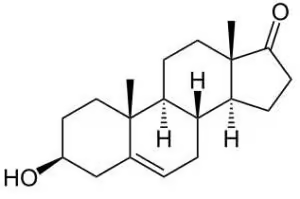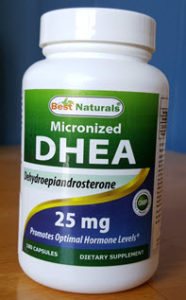Table of Contents
DHEA (dehydroepiandrosterone) is often called the “youth hormone”. DHEA is the most abundant hormone precursor in the human body. And a source of your sex hormones.
DHEA is the most common natural steroid found in human blood plasma. But decreases by about 80% between ages 25 and 75.[i]
DHEA deficiency is suspected in many age-related health issues. Including declines in brain and nervous system function. The latest research shows that DHEA supplementation can have powerful neuroprotective effects.
If you are feeling tired and overwhelmed, have low sex drive, or regularly suffer with depression or poor mood, there’s a good chance your body is not producing enough DHEA.
For more on how testosterone and estrogen affects your brain, see my article: Sex Hormones and Your Brain
DHEA helps:
- Brain Energy. DHEA helps to enhance neuron utilization of ATP. The primary energy source produced in your brain cell’s mitochondria. Keeping brain cell ATP levels optimized helps prevent age-related cognitive decline.
- Neurotransmitters. DHEA levels are directly associated with neurotransmitters involved in concentration, working memory, and executive function.
- Mood. DHEA supplementation can improve mood and energy while alleviating depression. And has been found to influence gene expression in the brain. It modulates the expression of genes directly involved in appetite, energy utilization and alertness.
What is DHEA?
DHEA (dehydroepiandrosterone) is the most abundant natural steroid hormone in your body. It’s sometimes called the “youth hormone”. And is a source of your sex hormones.

DHEA is naturally synthesized in your testes, adrenal glands, and brain. It’s a precursor to DHT and testosterone in men, and estrogen in women. And can activate both androgen and estrogen receptors.
Besides making DHEA, your adrenal glands also produce cortisol. Which is in direct competition with DHEA for production. When cortisol is high, especially for prolonged periods of time, your adrenal glands wear out. And DHEA production will decline.
DHEA can be made in the lab from wild yam and soy. But your body cannot produce DHEA from eating these foods. To boost DHEA you need to take it as a supplement.[ii]
DHEA Declines with Age
Your body’s natural production of DHEA varies with age. Low levels are produced before puberty. With peak production in your 20’s.
Between ages 25-30 to 75 your DHEA levels will drop by 80%. Affecting everything from alertness, memory, recall, and mood to sex drive. Its decline is even implicated in some neurodegenerative diseases.
The age-related variation in DHEA production has led scientists to believe that DHEA could be linked to the aging-process itself.
Many athletes use DHEA to increase muscle mass, strength and energy. But DHEA use is banned in the U.S. by the National Collegiate Athletic Association (NCAA). It’s also considered a “banned substance” by the NBA, NFL, and United States Olympic Committee.
In Canada, DHEA is considered a ‘drug’ and is only available by prescription. Which says something about the power of DHEA. It’s technically a steroid, which may be why it’s included in with Performance Enhancing Drugs (PEDs).
In 2007, the U.S. Congress tried to re-classify DHEA as an “anabolic steroid drug”. Which means this natural human hormone would have only been available as a prescription drug. Fortunately, this legislation never passed and you can still buy DHEA as an OTC supplement in the U.S..
Here we’re talking about how DHEA affects your brain health and chemistry.
How does DHEA Work in the Brain?
DHEA boosts brain health and function in several ways. But two in particular stand out.
- DHEA boosts working memory. Research has shown that higher DHEA levels are directly related to concentration, working memory and executive function (decision-making).
A study done in Australia in 2003 and 2004 worked with 295 women aged 21 – 77 years. The researchers set out to investigate whether circulating levels of DHEAS (dehydroepiandrosterone sulfate) contributed to cognitive function.
The women in the study went through a comprehensive battery of tests for cognitive function, and DHEAS levels. The researchers concluded that, “Higher endogenous DHEAS levels are independently and favorably associated with executive function, concentration, and working memory.”[iii]
Note: DHEAS is simply DHEA that is produced with the addition of a sulfate group. Naturally produced in your body, it produces the hormone estrone. DHEAS can be back-converted in the body to DHEA and both are often simply referred to as DHEA.
- DHEA enhances mood – naturally. DHEA has been found to improve both mood and energy while alleviating depression.
DHEA may be a good natural alternative to traditional antidepressants. A double-blind, randomized, placebo-controlled study was done at the U.S. National Institutes of Health with 46 men and women. The study subjects had been diagnosed with major or minor depression.
The depressed patients went through 6 weeks of DHEA therapy. 90 mg per day for 3 weeks and 450 mg per day for 3 weeks, and 6 weeks of placebo. They were then tested using two different Depression Rating scales, and for sexual function.
The study found that DHEA offered a significant improvement in depression symptoms. And major improvements in sexual function.
In a very rare admission from the conservative National Institutes of Health, “We find DHEA to be an effective treatment for midlife-onset major and minor depression.”[iv]
How things go bad when you are low in DHEA
As we get older, our brain chemistry and energy metabolism changes.
↓ Concentration, working memory and executive function decline
↓ Neuron receptors degenerate
↓ Adrenals wear out and DHEA levels decline
↓ Appetite regulation, energy and alertness decline
All of these age-related changes are influenced by declining DHEA levels. And are contributing factors to neurodegenerative diseases and depression.
DHEA levels are an inevitable consequence of aging. And can contribute to the onset of degenerative disease.
DHEA benefits
The latest scientific research validates what we know of DHEA’s anti-aging effects. And it’s not just for athletes. DHEA’s neuroprotective benefits are vital to memory and improving mood.
DHEA supports cardiovascular health and activates genes that prevent cardiovascular health problems, diabetes and obesity. It boosts quality of life and sexual function. It even improves the appearance of younger-looking skin.
DHEA supplementation can enhance cognitive function and memory, and improve decision-making (executive function). It’s even been shown to decrease brain cell death, and promote general cerebral health.[v]
How does DHEA feel?
You should experience a noticeable increase in motivation and drive soon after supplementing with DHEA. Especially if your levels are low.
If you are under constant stress, have chronic fatigue, feel weak, depressed or have a low sex drive – find a Naturopathic practitioner. And have your DHEA levels checked.
Too many neurohackers suffer unnecessarily from high stress and low DHEA production. Don’t be one of those people.
DHEA Clinical Research
DHEA is a steroid hormone and has a strong influence on both brain structure and function. Social and physical stress has severe negative effects in your hippocampus. Affecting memory and orientation.
DHEA seems to have a neuroprotective role in reducing the toxic effects of glutamate and cortisol elevated by stress. Studies show low DHEA levels in people suffering from major depression. And that if cortisol and DHEA are out of balance it will delay recovery from these diseases.
DHEA plays a role in the treatment of depression. Whether its caused by stress or aging. It affects both the cellular structure of the brain and its function.[vi]
DHEA Levels Predict How Long You’ll Live
Scientists in Japan set out to determine if DHEA levels could predict longevity. The study included 948 men and women aged 21 – 88 years. The researchers measured DHEAS levels at the beginning of the study. And periodically for the next 27 years.
DHEAS levels were higher in the men than women as expected. DHEA levels were measured along with blood pressure, and blood sugar. Of the three health measures, DHEAS levels in men were the strongest predictor of longevity.
It doesn’t matter what your age, blood pressure or blood sugar levels.[vii] This 27-year study concluded that DHEAS levels could be a way to predict how long you’ll live.
DHEA Improves Memory
Studies in rodents showed DHEA improved cognition. But there were inconsistent findings in humans tying cognition to DHEA supplementation. So scientists at the University of Newcastle upon Tyne in the U.K. decided to find out for themselves.
In this double-blind study, 24 healthy young men were treated with 150 mg per day of DHEA for 7-days. Mood, memory and the stress hormone cortisol were measured. Including scanning their brains to identify brain regions involved in cognition.
The study results showed a reduction in evening cortisol concentrations. And improved memory and mood. Recall significantly improved. And the researchers concluded this study was the first to show that DHEA had a beneficial effect on memory in healthy young men.[viii]
DHEA Levels Associated with Mood in Pro Golfers
Several studies suggest that DHEAS levels drop following different types of acute stress. Implicating DHEA’s role in coping with stress and recovering from stress.
Researchers in Taiwan wanted to find out what happened to DHEA levels during a negative outcome in an athletic competition. In this case, they studied 14 elite golfers participating in a major national golf tournament.
The golfers were divided into 2 groups. One group made the cut during the competition. And the other group did not make the cut. DHEAS levels were measured in both groups 1-day before the competition. And then on days 1, 3 and 5 after the players’ final competition.
Study results showed that DHEAS levels in players that made the cut during the competition did not change. Those players that failed to make the cut experienced a drop in blood concentrations of DHEAS.
This study suggests that DHEA plays a role in your coping mechanism during psychologically challenging times. Supplementing with DHEA during times of stress could help alleviate some of the symptoms normally associated with high stress levels.[ix]
DHEA recommended dosage
Recommended dosage of DHEA is 25 – 50 mg per day.
DHEA is a strong steroid hormone. And low supplemental doses affect gene expression in inhibiting metabolic syndrome. DHEA supplementation boosts bone strength and enhances cognition and memory.
DHEA supplementation is not recommended for anyone under 18 years old. And like many nootropics, too much DHEA is NOT a good thing. It can lead to problems.
Many nootropics users and doctors recommend taking “hormone holidays”. In other words, use DHEA for a month then take a month off.
Supplementing with DHEA beyond the normal range may be advisable for short periods of time. Such as restoring a badly depleted adrenal system. But maintaining large doses of DHEA can lead to unpleasant side effects.
Note: If you have been diagnosed with a hormone-dependent cancer, you should not supplement with DHEA until your cancer has been cured.
DHEA Side Effects
Testing for DHEA levels is very important if you’re planning on supplementing with this powerful compound. Because if your hormone levels are normal and you start taking DHEA, you could experience side effects like acne, hair loss, tumor formation, heart arrhythmia, and insomnia.
At higher than 100 mg doses, DHEA has been linked to side effects. Many experts caution against high-doses of DHEA. Or long-term usage.
Type of DHEA to buy
The most common form of DHEA is in capsule form. Supplement manufacturers offer capsules ranging from 10 – 100 mg. You can even get DHEA as an ointment, lozenge or cream.
Keep in mind that a 25 mg DHEA capsule will not deliver 25 mg of DHEA to your system. It first must pass through your liver where it’s further broken down.
Your body is not used to getting hormones through your digestive system. Once swallowed, only 10-15 percent will eventually reach the tissues you are targeting – like your brain.
This is why many Naturopathic practitioners suggest using a DHEA cream instead. But here again you have a problem. While more DHEA is bioavailable by using DHEA cream on your skin, some argue there’s even a better way to take DHEA.
And that’s by applying the cream to the membranes of your vagina if you are a woman. And in your rectum if you are a man.
One other option is to take DHEA sublingually. It makes logical sense that if taken under your tongue, DHEA bypasses your liver. And goes directly into your bloodstream.
Personally, I use 25 mg of DHEA in capsule form in the morning, and another 25 mg at noon. And have experienced a considerable boost in energy during the day. But cycling one month on, and a one-month off to give my body a “hormone holiday”.
Nootropics Expert Recommendation
DHEA 25 – 50 mg per day
 I recommend using DHEA as a nootropic supplement. But with a huge caveat.
I recommend using DHEA as a nootropic supplement. But with a huge caveat.
Get your DHEA levels checked before starting supplementation to be on the safe side.
Your body does make some DHEA on its own. But DHEA production inevitably declines with age. And possibly even faster depending on the health of your adrenal glands.
If you are under constant stress, have chronic fatigue, feel weak, depressed or have a low sex drive – find a Naturopathic practitioner. And have your DHEA levels checked.
Too many neurohackers suffer unnecessarily from high stress and low DHEA production. Don’t be one of those people.
Maintaining optimal DHEA levels can enhance cognitive function and memory, and improve decision-making (executive function). It’s even been shown to prevent brain cell death, and boost general cerebral health.
Start with 25 mg of DHEA per day. And see how you feel. Increase the dose to no more than 50 mg per day. And watch for side effects. And don’t forget to cycle it. Take it for a month and take one month off.









Join The Discussion - 111 comments
Matthew
October 25, 2024
Dear Mr Tomen,
Thank you for your invaluable website. Greatly appreciated.
I have 2 questions;
1/ Regarding cycling, you suggest 1 month on and 1 month off.
What do think about rather, taking the DHEA 1 day on, and 1 day off? Is there any validity in doing this?
Forgive my ignorance but the monthly cycle makes me think the body would be in a kind of roller coaster situation, whereas the latter would result in a more even distribution. Any comments on this please?
2/ I have read studies linking DHEA supplements to nephrotoxicity. Have you read any such studies and do you feel there is a legitimate concern in this area?
Thank you for helping so many people with your research and generosity.
David Tomen
October 25, 2024
Matthew, cycling DHEA depends on your age. If you are older it does not make any sense to cycle because your body can’t produce enough DHEA on its own. On the other hand, and with sex hormones suppressed worldwide and in all ages this advice likely applies to any adult male. But it is wise to get your labs done every few months so keen on top of your sex hormones levels.
And stay on top of your kidney health no matter what supplements you are using. That is easy to check with your regular labs.
James
August 29, 2024
Hi , I’m about to start taking DHEA tincture should I cycle it the same way as I cycled the capsules 1 month on and 1 month off your advice would be much appreciated- James
David Tomen
August 29, 2024
James, the only way to find out if you need to cycle DHEA or not is to get your labs done. If you are deficient there is no reason to cycle.
Sander
July 24, 2024
David, I increased my DHEA dosage from 25 to 50. I started to feel a little fatigued. In your experience with nootropics, have you heard any reports about dhea causing fatigue? Thanks again for such valuable information on your website.
David Tomen
July 26, 2024
Sander, DHEA is a hormone and overdosing hormones is never a good idea. You need to find out the dose that works for you and the only real way to do that is use a reasonable dose for a month then get your labs checked. DHEA is a simple blood test and that will tell you if you need more or less of DHEA.
sander
June 27, 2024
David, how are you? I will supplement DHEA 50 mg. In your opinion, should I take 25mg when I wake up and another 25mg at lunch? Thank you one more time!
David Tomen
July 2, 2024
Sander, I take my DHEA dose in the morning and with consistent daily use it will build up in your system. Then using it after that is maintenance to keep your DHEA levels optimal.
Hashem
August 18, 2023
Hi Mr. Tomen.
I am currently trying to have a better handle on my libido. And I want to understand DHEA as best that I can.
I got a DHEA-S test done. It was a normal range of 400 ug/dl. (The range being 106-464 ug/dl)
Am I to understand correctly that DHEA-S does not truly test for DHEA?
And that DHEA by itself is what can potentially turn into testosterone?
David Tomen
August 21, 2023
Your adrenals and testes produce DHEA sulfate which goes on to make testosterone, androstenedione, and estrogen. DHEA-S is what is tested during labs. If you levels are in the upper curve of the bell curve you should not be supplementing with DHEA.